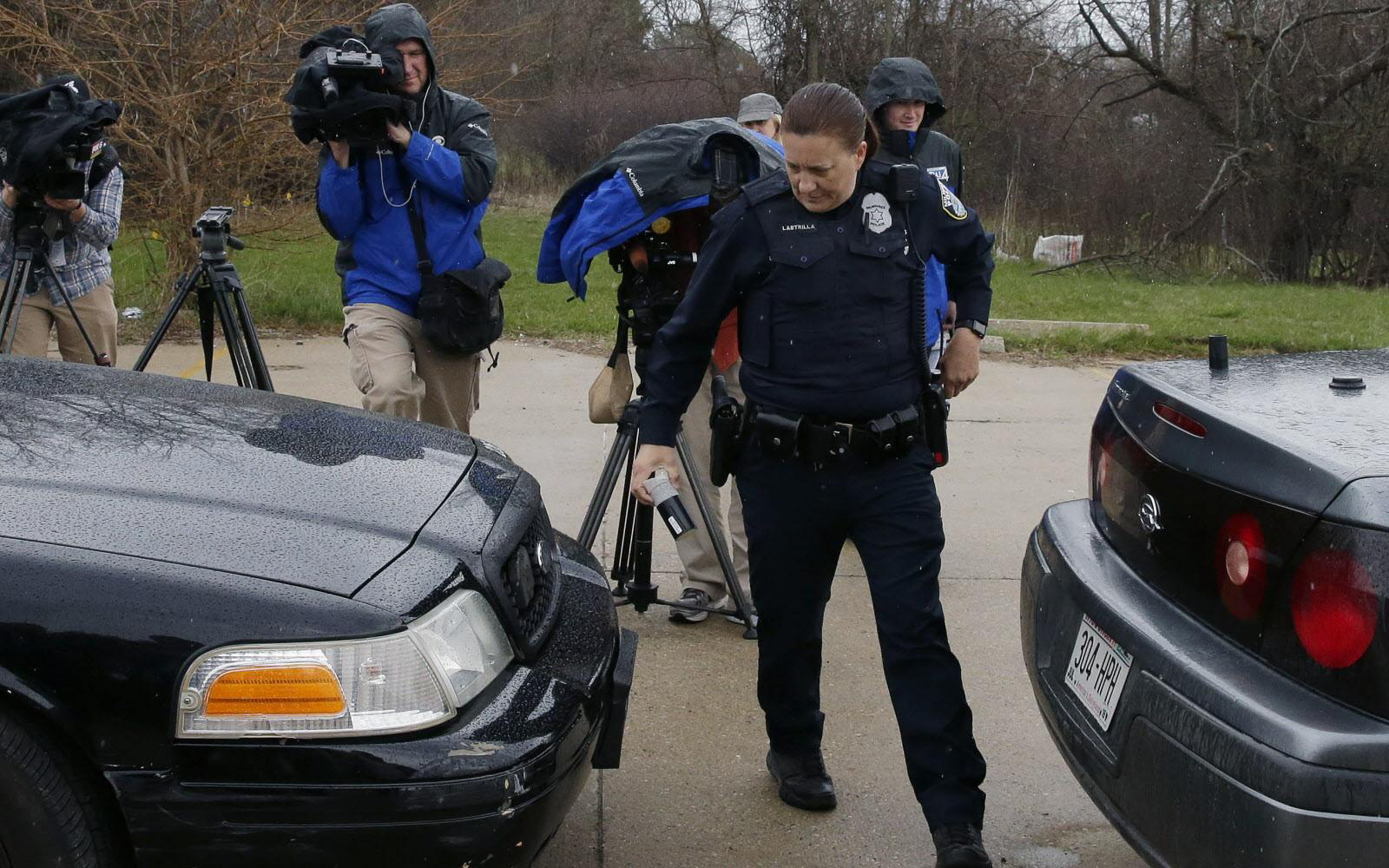MILWAUKEE — The latest technology in use by the Milwaukee Police Department seems like something from a comic book or spy novel.
Devices mounted on squad cars fire GPS units onto fleeing vehicles to track them without engaging in high-speed chases.
Early results of the Milwaukee pilot program show the devices have been deployed successfully about 50% of the time — meaning the GPS unit is launched by an officer and sticks to the fleeing vehicle. Department officials say they expect that rate to improve to closer to 75% as officers get more familiar with the technology.
"The 75% rate is doable," said Trevor Fischbach, president of StarChase LLC, the maker of the tracking device. "With further training and use," it's not unheard of for agencies to see a 75% to 80% rate.
During a demonstration for reporters Tuesday, the GPS unit bounced off the intended target car twice. Conditions were not ideal, officials said, noting the steady rain and stationary cars (officers frequently are firing at a moving target).
Still, front-line officers say the technology is valuable and has been used to find suspects in violent crimes, such as carjackings and robberies.
"It helps us locate the vehicle and even if we don't have the suspects in custody, we still have evidence," said Officer Kim Lastrilla.
In August, Milwaukee officials announced the police department would use the technology, which was created by StarChase in Virginia Beach. The move came during continued public discussion about the department's restrictive pursuit policy. Since 2010, the policy has required officers to have probable cause that someone in the car is committing a violent felony or is "a clear and immediate threat to the safety of others" before pursuing the person.
Fischbach said less than 100 police departments across the nation are using the devices in about 25 states.
"We're not in every state of the union," he said, but "we're making progress."
Supporters say the policy is saving lives by limiting pursuits, while critics argue it allows criminals to get away.
'GPS bullet'
StarChase uses battery-powered GPS trackers. A compressed-air launcher, mounted behind the grille of a police car, uses a laser to target the fleeing vehicle. When an officer fires the device, a tracker — sometimes called a "GPS bullet" or tag — is released.
The tag has an adhesive so it can stick to the fleeing car. Dispatchers and officers can then track the car on a computer or mobile device. A standard StarChase unit costs just under $5,000. Milwaukee's police department used asset forfeiture funds to pay for the units, but a total cost was not released Tuesday. Police officials also have not said how many units were purchased or how many squad cars are outfitted with the technology.
The StarChase pilot program began in December, and since then the devices have been used 55 times with 27 successful deployments, a Milwaukee police spokesman said.
The Milwaukee Journal Sentinel requested any incident reports dating from Aug. 1, 2015, through Jan. 24, 2016, that contained a reference to StarChase.
The Police Department released 16 reports last month in response to the request. Six of the incidents had enough information to determine whether StarChase was used successfully, while the other 10 contained few details because they were the subject of ongoing investigations.
StarChase was used successfully in three of the six reports: to track a driver who fled a traffic stop and was on probation with open warrants; to catch a driver who had been operating a car reported stolen in Illinois; and to find a stolen vehicle and arrest several of the occupants.
In one of the reports, officers tried to use StarChase but it failed to fire. The officers replaced the defective unit and returned to the same area where a suspect had been. They saw the suspect in a vehicle and tried again to use StarChase, but this time, the GPS tracker failed to stick and bounced off the car.
In another report, a tracker bounced off a vehicle. In a third instance, officers could not safely maneuver to deploy StarChase and did not fire it.
"We know we save lives," Fischbach said. "We've had no loss of life with StarChase," as well as no injuries and "nearly zero property damage."
Emergency use only
StarChase can be used only in exigent, or emergency, circumstances, according to a directive from Police Chief Edward Flynn and a training bulletin governing the technology's use during the pilot program.
"As long as there's exigency and as long as there's a reason to pull the car over, there should be no privacy issues," Inspector Terrence Gordon said Tuesday. "No GPS technology should be used absent exigency or a warrant."
Civil liberties experts have said there probably isn't a problem as long as the technology is used when a police officer has the equivalent of probable cause and does not have time to get a warrant.
But tracking should end as soon as police catch up to the fleeing vehicle and police also should not delay stopping the vehicle as a way to learn more about the driver via the GPS, the American Civil Liberties Union has said.
"StarChase isn't going to be a tool for every situation," Fischbach said. But when they are used, "the results are fantastic." StarChase provides law enforcement professionals with another set of choices, he said.
A formal department policy has not gone before the city's Fire and Police Commission. The Journal Sentinel requested any policies governing the technology's use and received redacted copies of the training bulletin and directive.
Officers cannot pursue vehicles that have fled from traffic stops just to deploy StarChase unless the chase is justified under the existing pursuit policy. They also cannot use StarChase on motorcycles. Otherwise, officers can exercise discretion about when to use it and do not need approval of a supervisor.
Contributing: Nicole L. Gill, USA TODAY. Follow Ashley Luthern on Twitter: @aluthern

![gps_bullet_042016 [image : 83282844]](http://www.gannett-cdn.com/media/2016/04/20/USATODAY/USATODAY/635967519386580766-gps-bullet-042016.jpg)

